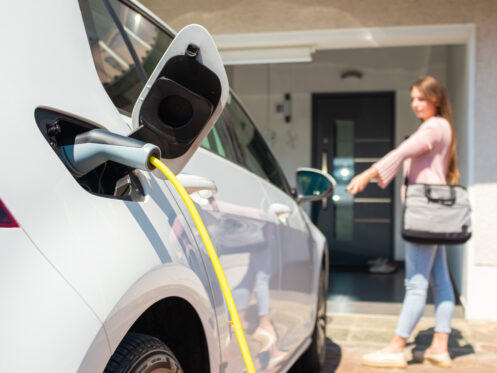In response to growing worries about global warming and the state of the environment, more and more people are opting to drive electric vehicles (EVs) instead of gas-powered ones. The growing popularity of EVs begs the question: Will EVs become the dominant mode of transportation in years to come? And if so, what does this mean for homeowners?
The Rise of Electric Vehicles
The EV market has experienced remarkable growth in recent years, with sales of electric vehicles steadily increasing worldwide. Governments and automakers continue to invest extensively in EV research and manufacturing to innovate and expand consumer options. Another key driving force behind the rise of electric vehicles is their environmental benefits. Unlike conventional gasoline-powered cars, EVs produce zero tailpipe emissions, reducing air pollution and greenhouse gas emissions.
EVs are increasingly feasible and enticing to customers due to improvements in battery efficiency and range. The infrastructure supporting electric vehicles has also seen significant improvements, with the expansion of charging networks and the development of fast-charging technology. This makes it easier and more convenient for EV owners to recharge their vehicles.
Are Electric Vehicles the Future?
Many arguments support the notion that electric vehicles are the future of transportation. The environmental benefits of EVs, coupled with advancements in technology and infrastructure, make them a compelling choice for addressing climate change and reducing dependence on fossil fuels.
However, widespread adoption of electric vehicles is not without its challenges and limitations. One of the main barriers to EV adoption is the higher upfront cost compared to that of traditional gasoline-powered cars. Concerns over limited driving range, charging infrastructure and battery life remain significant factors influencing consumer decisions. Plus, the transition to electric vehicles poses logistical and economic hurdles: It requires a significant investment in infrastructure plus modifications to current transportation systems. Despite these challenges, trends and projections in the automotive industry suggest that electric vehicles remain poised for continued growth and expansion.
Electrical Changes for Electric Car Owners
Before transitioning to electric vehicle ownership, it’s important to consider the electrical changes you’ll need to make to your home. This may involve installing a dedicated charging station, upgrading electrical panels and assessing the overall capacity of your home’s electrical system.
Home Charging Basics
One of the fundamental aspects of owning an electric car is setting up a reliable home charging station. Home charging provides convenience and flexibility, allowing electric car owners to recharge their vehicles overnight or whenever it’s most convenient for them.
To set up a home charging station, owners typically install a Level 2 charging unit, which requires a dedicated 240-volt circuit. However, there are several options available.
Level 1 Charging
Level 1 charging involves using a standard 120-volt electrical outlet to charge the electric car. It’s the slowest charging option but requires no additional equipment other than the EV’s charging cable.
Level 2 Charging
Level 2 charging stations require a 240-volt electrical outlet and provide faster charging speeds compared to Level 1. These stations, commonly installed in residential garages, require a dedicated circuit.
Wall-Mounted Charging
Wall-mounted charging stations offer a convenient, space-saving solution for home charging. They are typically installed on a wall in the garage or driveway and come with features such as adjustable power levels and smart connectivity.
Portable Charging
Portable charging stations allow electric car owners to charge their vehicles at different locations using a 240-volt outlet. These stations are compact and easy to transport, making them ideal for travelers or those without access to a fixed charging station.
Smart Charging
Smart charging stations offer advanced features such as remote monitoring, scheduling and energy management. Users can optimize charging times and energy use by controlling them via a smartphone app or home automation system.
Electrical Upgrades
Transitioning to electric vehicle ownership may require electrical upgrades to accommodate the increased power demands of charging an electric car. In some cases, older homes may have outdated electrical systems that cannot support the additional load of charging an electric vehicle. As a result, homeowners may need to install a higher capacity electrical panel, upgrade wiring to handle higher amperage and add dedicated circuits for the charging station. Consulting with a licensed electrician is essential to assess the home’s electrical infrastructure and determine the necessary upgrades for safe and reliable charging.
Solar Panels and Battery Storage
For electric car owners looking to reduce their carbon footprint and lower their energy costs, integrating solar panels with battery storage can be an attractive option. Solar panels harness energy from the sun to generate electricity, power the home and charge EVs. Battery storage systems store excess solar energy for use during periods of low sunlight or high energy demand. They provide a reliable source of clean energy for charging electric cars.
However, the installation of solar panels and battery storage systems requires careful planning and consideration. Homeowners must consider factors such as rooftop suitability, system size and local regulations. Consulting with solar energy professionals can help you determine the best solar and battery storage solution for your needs. This will also help maximize the benefits of clean, renewable energy for electric vehicle charging.
Cost Considerations
Several cost considerations come into play when contemplating electric car ownership. Upfront costs include the purchase price of the vehicle, which can be higher than that of a traditional gasoline-powered car. You also need to think about how much it will cost to install home charging stations and other electrical changes you may want. It’s equally important to think about recurring expenses like insurance, charging costs and maintenance. Using time-of-use charging means charging your electric vehicle when electricity prices are lower, typically during off-peak hours. This helps lower the cost of charging your vehicle overall.
Government Incentives and Policies
To encourage the purchase of EVs, several government agencies provide financial incentives such as rebates, tax credits and subsidies. According to Nerd Wallet, buying a new EV may qualify you for a tax credit as high as $7,500 from the federal government, while a used RV purchase may qualify for up to $4,000 in tax breaks. To further lower the cost of ownership, several areas even provide financial support for the installation of home charging stations. These incentives not only make electric car ownership more accessible and affordable for homeowners; they also accelerate the adoption of sustainable transportation solutions.
How to Have Adequate Infrastructure for EVs
One of the most effective ways to prepare for the anticipated dominance of EVs is by equipping the home with multiple charging stations. This proactive approach helps avoid congestion and delays in charging and ensures convenient access to charging for all EVs in the household and even for guests.
What You Can Expect During a Charging Station Installation
During a charging station installation, you can expect a licensed electrician to assess your home’s electrical system and determine the optimal location for the charging station. The electrician will then install the necessary wiring, circuit breakers and outlet or charging unit according to safety standards and manufacturer specifications. Final testing will confirm the charging station’s correct functioning and safety.
Does your home need electrical upgrades to accommodate a charging station? If so, Cozy Home Services wants to help. We specialize in HVAC, plumbing and electrical services for Vacaville, CA homes.
Get in touch with Cozy Home Services today to make an appointment or learn more about what we can do for you with our electrical solutions.


